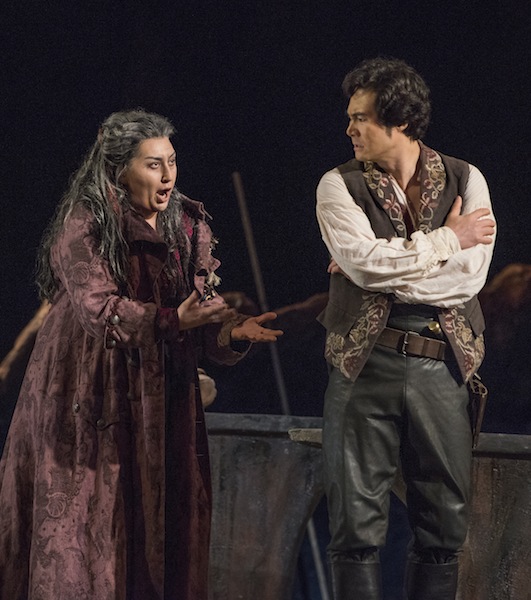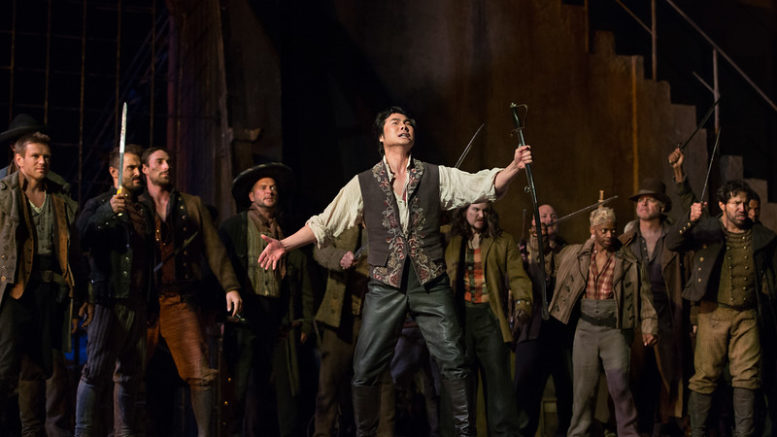Low voices soar high in Met’s brooding “Trovatore”

Anita Rachvelishvili and Yonghoon Lee in Verdi’s “Il Trovatore” at the Metropolitan Opera. Photo: Karen Almond
In the Metropolitan Opera’s strong revival of Il Trovatore Monday night, it wasn’t the title character and his paramour who took the spotlight. This performance, rather, was dominated by the two troubled antagonists who use the leading couple as props in their own revenge drama.
It makes sense, in a way. Verdi’s classic melodrama revolves around curses, mistaken identities, fratricide, suicide, and ancient grudges; who better to drive the performance than Azucena and Count di Luna, the two vivid characters who set it all in motion?
For years, the Met has had a go-to mezzo-soprano for the gypsy Azucena, in company veteran Dolora Zajick (who will in fact be singing one performance later in the run). They may have found a new one in Anita Rachvelishvili. This is hardly the Georgian mezzo’s first outing at the Met—she’s played several Carmens since her 2011 debut—but this was by far her most complete performance with the company to date.
When she took the stage in Act II for “Stride la vampa,” she unleashed the kind of forceful, energetic sound that can make even the drowsiest listener sit up straight. This was a gripping portrayal from the moment she stepped on, with a laser intensity in her eyes and in her delivery to match the throbbing, burning power of her voice. There was never a break in the consistency of her sound: from the rich smolder of her chest voice to her penetrating top, she maintained a focused, vigorous tone.
Rachvelishvili gave the sort of star performance on Monday that can be a major inflection point for a career, showing an unswerving commitment to her portrayal that came through in her searing vocal characterization. After this Azucena, it’s easy to imagine her in other dramatic mezzo roles; Don Carlo’s Eboli would be a perfect fit.
As her foil, Quinn Kelsey was a marvelous, brooding Count di Luna. Listed as a baritone, he sounded more like a basso cantante in Monday’s performance, bringing an enormous voice with a deep, woody, rough-grained sound. This was not quite the sort of smooth, caressing vocal performance we often get from more lyric Verdi baritones in this role, yet his instrument is flexible enough to sing the role’s flowing lines. To hear familiar arias like “Il balen del suo sorriso” sung with such weight cast the music in a new light. Just hearing Kelsey was terrifying, and his glowering demeanor and imposing presence made him a fearsome villain.
Tenor Yonghoon Lee gets more secure with every outing at the Met, and his performance as Manrico was, on the whole, excellent. He’s settled in now as a reliable tenor with a consistent, muscular sound and clarion top, and gives a passionate delivery of every role he takes on. On this occasion, attempts at pointless hairpins and excessive high pianissimos did not serve him well; but to the extent that he stayed away from overly precious phrasing, this was an impressive outing.
Jennifer Rowley, after several promising appearances at the Met recently, took a step back in Monday’s performance. She was engaging in her first attempt at Leonora, but her voice sounded overwhelmed by the part: pushing herself to find more vocal weight, she only succeeded in smothering her cool, bright soprano with a colorless wobble. Rowley eventually warmed up, but in “Tacea la notte placida,” her top was shrill and there was little body to her middle voice. She deserves some forbearance, having stepped in for Maria Agresta with only two weeks’ notice, so one can hope that she’ll settle in as the run continues.
Štefan Kocán strutted imperiously as di Luna’s lieutenant, Ferrando, offering a commanding presence and a heavy, gravelly voice. Sarah Mesko made an endearing Ines, warm and tender with her dark-hued mezzo.
Marco Armiliato had the Met Orchestra in fine voice, and while his reading of the score was by-the-book, he provided ideal support for the singers. Many of the evening’s highlights, as a result, were trios or ensemble numbers, where his pacing helped maintain the thrill of the music. Donald Palumbo’s choristers were in top form, blaring forth with bright power in the famous “Anvil” chorus.
Even with such sterling performances as Monday’s, the 2009 production by David McVicar is growing stale—it’s walls, gates, and more walls, rotating grandly on the stage’s main turntable without really showing much of an atmospheric difference between one scene and the next. The staging has its moments of swashbuckling fun, such as the sight of the rebels scaling the gate at Leonora’s convent to surprise di Luna and his men, but grappling with the drama of the work is left entirely up to the principals.
Il Trovatore runs through February 15 at the Metropolitan Opera. Luca Salsi takes over the role of Count di Luna and Kwangchul Youn takes over the role of Ferrando beginning February 6. Dolora Zajick appears as Azucena on February 6. metopera.org
‘Il Trovatore’ Proves Met Still Delivers Great Singing—If You Know Where to Look

Mezzo Anita Rachvelishvili illuminates the complex character of Azucena in the Met’s Trovatore. Karen Almond/Metropolitan Opera.
As Jane Powell, Kathryn Grayson and innumerable state-level pageant contestants have so often reminded us, “Love is where you find it, / Don’t be blind, it’s / All around you, everywhere!” And so it is with good singing in the Met’s current Italian opera performances: it’s there, but you do have to do some digging to turn it up.
In last night’s revival of Verdi’s Il Trovatore, for example, it was very hard to love Yonghoon Lee’s blatty and blatant attack on the leading role. The title of the opera means “The Troubadour,” that is, someone who makes his living as a poet and singer, but this kind of art doesn’t seem in Lee’s wheelhouse.
Everything seemed focused on making the loudest and longest high note possible at the end of the aria “Di quella pira,” an effect Lee accomplished only by omitting half the music and finally striking a squatting pose, which indicated not so much heroic defiance as acute constipation.
Opposite him, as the self-sacrificing noblewoman Leonora, Jennifer Rowley shoved her medium-weight soprano violently off-pitch with a juddering vibrato. Now, it is true that some of history’s greatest sopranos have sung sharp from time to time: Zinka Milanov, Leonie Rysanek, Anna Netrebko. But there were times last night Rowley seemed literally to have landed in the wrong key.
I hate to be prescriptive, but it seems to me the singer might better have spent her time working out this technical issue instead of interpolating that pair of tasteless and hard-edged high C’s in the final act.
The contrast could not be greater with Anita Rachvelishvili’s eloquent portrayal of the beleaguered Azucena. Yes, she flung out her big, red-blooded mezzo in great cries of despair, but those were set in relief by exquisitely musical gradations of volume from pianissimo to mezzo-forte.
Particularly lovely was her take on the nostalgic “Ai nostri monti” in the last act, sung with a sweet and childlike timbre. It was as if in her last moments of life, the tormented woman found refuge in an untroubled past.
If baritone Quinn Kelsey didn’t quite scale such towering emotional peaks, he did accomplish the daunting task of singing the demanding music of Di Luna with the elegance suitable to a nobleman in love.
At most performances of this opera, listening to “Il balen del suo sorriso” is like watching a tightrope act: so many things can go wrong. But when Kelsey spun out the aria with perfect legato, one could relax and, for once, appreciate the dramatic point that the character thinks of himself as not so much evil as simply lonely.
Perhaps best of all, the Met chorus sounded youthful and vibrant throughout, and the women portraying nuns in the second act even managed the practically unprecented feat of staying in tune during their offstage prayer. I only wish some of their musicianship would rub off on conductor Marco Armiliato, who took big, disfiguring cuts in number after number.
In Donizetti’s L’Elisir d’Amore on January 16, the finest performance was an Easter egg indeed: the crisp, rangy baritone of debuting Davide Luciano caught the ear from the very first phrases of his opening aria. He outshone both Matthew Polenzani’s Nemorino (his “Una furtiva lagrima” felt a little calculated), and Pretty Yende’s Adina, marred by intermittent loss of focus in her pearly soprano.
&&&&&&&&&&&&&&&&&&&&&&&&&&
 Ken Howard/Metropolitan Opera
Ken Howard/Metropolitan Opera
&&&&&&&&&&&&&&&&&&&&&&&&&&
Metropolitan Opera 2017-18 Preview: 3 Reasons to See Revival of Verdi’s ‘Il Trovatore’
 Ken Howard/Metropolitan Opera
Ken Howard/Metropolitan Opera
On Jan. 22, 2018, the Metropolitan Opera will revive David McVicar’s production of Verdi’s “Il Trovatore.” The production runs until Feb. 15, a total of eight performances.
This year’s production is set to offer up quite some delights for newcomers to Verdi’s mid-period masterpiece. Here’s a look at some reasons you must see this revival.
Rising Stars Take the Lead
Just a few days ago, Jennifer Rowley took over the role of Leonora from an ailing Maria Agresta. Rowley is no longer a best-kept secret among American opera stars, the soprano making quite the impact a year ago in “Cyrano de Bergerac” at the Met. She also got a performance of “Tosca” last week and this role will cement her as one of the future stars of the Met.
But she isn’t the only one to keep an eye out for. Anita Rachvelishvili is a Met veteran, arguably the finest “Carmen” interpreter of the last decade with the company, but she is only just coming into her own as Azucena. She scored raves during her previous outings and there is no reason to believe that she won’t cement herself as THE Azucena of the near future.
Finally, two baritones who are establishing their legacies as the greatest Verdi baritones of their generation will share the role of the Conte di Luna. First up is Quinn Kelsey with the first four performances, followed by Luca Salsi, who gets the final four shows.
Seasoned Veterans
There will be a number of veterans of the role incoming. For years Dolora Zajick has been the go-to Azucena at the Met. She gets one performance, on Feb. 6.
Yonghoon Lee isn’t exactly a grizzled vet, but he is no newbie to this production, having performed it five times during the 2015-16 season alongside Anna Netrebko and Dmitri Hvorostovsky, including an HD performance.
Stefan Kocan has also performed the opera at the Met in this current production 10 times between 2011 and 2015. He shares the role of Ferrando with veteran artist Kwangchul Youn, who has performed the opera 14 times, including the premiere of this production.
The Production
For years, the Met had no idea what to do with this Verdi work as productions fell flat with audiences. But in the hands of David McVicar, the production has found new life at the theater. It vibrates with ideas about brotherhood and betrayal and its rotating set keeps this propulsive opera from losing its pace.
No comments:
Post a Comment